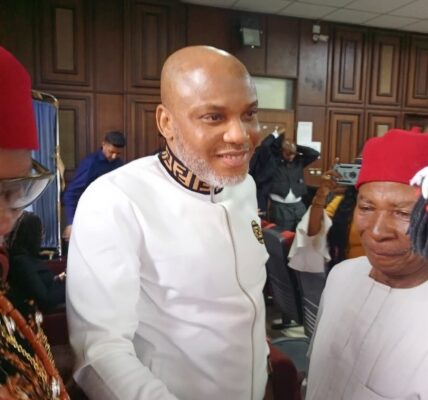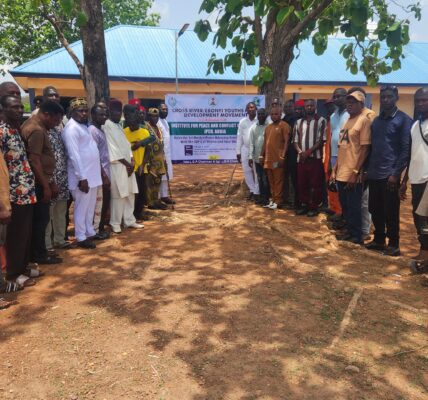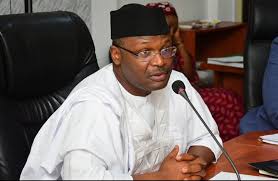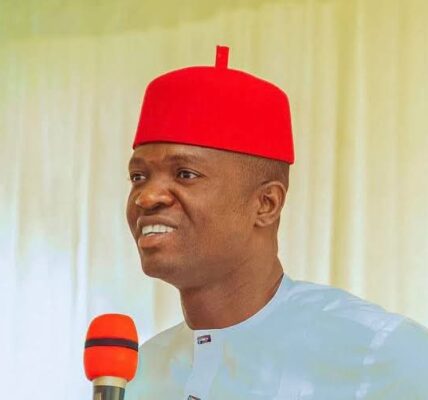Alex Otti Presents N1.016trn 2026 Appropriation Bill to Assembly
The governor of Abia State, Alex Otti on Tuesday presented a N1.016 trillion 2026 budget proposal to the State House of Assembly.
Otti described the fiscal plan as a blueprint for accelerated growth and expanded opportunities.
Presenting the appropriation bill, christened ‘Budget of Acceleration and New Possibilities’, to Speaker Emmanuel Emereuwa and members of the 8th Assembly, Otti said the proposal reflects his administration’s ambition to deepen infrastructural development, strengthen social services and sustain ongoing economic reforms.
According to him, the 2026 estimate represents a 13 per cent increase from the 2025 budget.
Otti disclosed that the government plans to commit N811.8bn, representing 80% of the total budget, to capital projects, while N204.4bn (20%) is earmarked for recurrent expenditure.
He added that the target for 2026 is to fully fund recurrent spending from the state’s Internally Generated Revenue, while funds sourced externally would be strictly channelled into infrastructure.
The governor projected that Abia will earn N83.2bn from FAAC, N67.1bn from VAT, N26.5bn from grants and aid, and N168bn from other federal revenue channels
Combined internal and external revenue for 2026 is estimated at N607.2bn, leaving a deficit of N409bn, which he said amounts to 40% of the budget.
Otti said the deficit will be financed through loans obtained at concessionary rates, reiterating that his administration will not borrow to fund recurrent expenditure.
“We shall borrow only when necessary, and such funds will be deployed exclusively for projects capable of repaying themselves in the medium to long term,” he said.
The government is allocating N203.2bn (20% of the budget) to the education sector.
Of this, N150.4bn will cover salaries for about 15,000 teachers and capital projects, plans include building 17 model primary and secondary schools, 3 technical colleges and establishing staff quarters and ICT labs in over 100 public schools and N52.8bn is earmarked for tertiary institutions such as ABSU, Ogbonnaya Onu Polytechnic and Abia State College of Education (Technical), Arochukwu.
A total of N149.7bn (15% of the budget) is proposed for healthcare delivery.
Key projects include the supply of essential medical equipment to ABSUTH and 23 other public health facilities, the reconstruction or renovation of seven general hospitals, and infrastructure upgrades to boost health manpower development
The state plans to spend N169.3bn (16.7%) on road construction, rehabilitation, and maintenance.
Major projects include Umuahia–Ikot Ekpene Road, Ahiaeke–Okwuta–Bende Road, Umuahia–Umueze–Agwu–Mbom Road, Nkata–Amaeke Road, Agbo–Umueze Road and several community-impact roads across the state.
N11.1billion has been allocated, with N6bn set aside for the purchase of 80 additional 40-seater electric buses.
Funds are also provided for the completion of inter-modal transport terminals, junction improvements, and the construction of bus shelters.
Otti confirmed that the first batch of 20 customised electric buses has already been delivered.
The governor said the budget incorporates programmes to support entrepreneurs, farmers, youths in sports and ICT, women, and vulnerable households.
He noted that more than N229bn has been earmarked to advance initiatives in housing, environmental protection, urban renewal, and cultural development.
Otti said recent independent assessments ranked Abia among states with improved fiscal governance and rising revenue performance.
He attributed this to investments in infrastructure, security, and technology-driven revenue collection systems.
The state’s IGR, which stood around N20bn a few years ago and is projected to hit N100bn in 2025, is now expected to reach N223.4bn in 2026.
According to him, this projection is based on improved investor confidence and continued expansion of economic activities across the state.
Otti had, in September, called on the traditional rulers, the civil society organisations, and the youths to come up with inputs and suggestions that would form the fulcrum of the 2026 budget






